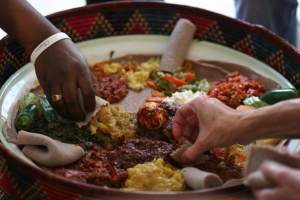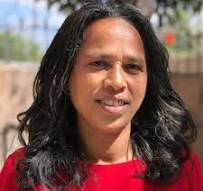
Among the deep-seated social, cultural, and religious values that Ethiopians have been practicing and cherishing for centuries, the value of eating and drinking together; and sharing what one has with the other is the one. It is common for Ethiopians to eat and drink not only with family members and neighbors but also with visitors and guests. This incomparable culture beyond signifying the strong bonds between and among Ethiopians, it symbolizes the welcoming, hospitable, respectful, and considerate nature of Ethiopians.
Holidays are one platform that shows the cultural depth and wealth of Ethiopians. During holidays, it is a normal thing for Ethiopians to prepare food and drinks for a larger number of people- for those who are going to be invited on holidays as well as those well-wishers who may come by luck to extend their best wishes. On such days, the houses and the compounds are required to be neater and aesthetically appealing than before; and make it more attractive and comfortable to the invitees.
Since society is still patriarchal, the activities mentioned above are supposed to be done by the female members of the family. I remember that when I was a very little girl, holidays especially Ethiopian News Year had been arriving with assignments for me and the girls of my age. Collecting firewood for cooking and baking bread or ‘Diffo’ was our responsibility. Since a large quantity of food with a wide variety is needed for this day, we, females, were expected to transport the heaviest kilograms of cereal foods to the grinding house. The necessary inputs for the festival were planned and collected by elder females and we little ones were there for carrying and frequently moving to shops and markets.
On the festival day, it is also females who are expected to serve the food and drink. The males simply watch and enjoy the incident with the guests. Females are used to be kept away from the views of the people. Merely, young girls can watch the ceremony when elders need them for help. This is the dominant story of Ethiopian girls especially those in the Northern part of the country though; over time the magnitude is becoming a bit lower.
To find further experience on the issue, I invited Dagmawit Abebe (PhD), the name was purposely changed as per the interest of the woman, who is an Assistant Researcher at Addis Ababa University. We talked about her role as an office worker and a married woman especially during holidays. She is a very strong woman who accomplished her educational achievement and managed her marriage at a time. Here under are her experiences. Encrypt!
Dagmawit was born in the southwest part of the country. Like many Ethiopian girls, she had been experiencing backbreaking household chores. The females in her family were the most busiest and burdened sections during holidays. After completing her first degree, she was a bit free and was able to celebrate festivals as her counterparts, males. Since she was away from her family for work, on holidays she went to visit them as a guest. The housework jobs were covered by the other family members. Thus, her stay with her family was a bit relaxed and enjoyable. After some years, Dagmawit got married. Now, it is she, as the socialized structure, expected to take over household routines.
In her office, Dagmawit is the best and most respected director. She managed her office work as per the guidelines of the office. She is strong in mobilizing the employees under her section. She published research papers effectively. Since she was very committed, she prioritized her work over her comfort. She had no one who could take care of the household jobs and her two babies. Therefore, she did her best to finish her work assignments in her office so as to free herself from the house necessities.
When she comes home, the disordered house and the remaining routines are eagerly looking for her arrival. She then changes herself and faces the usual household chores. This was the way of life that she used to lead till her husband got involved in these duties.
I was very keen to know how she manages the jobs during holidays. And before that reflection, I raised the following question. “Are you strict in respecting those cultural expectations to be done for holidays?” She was too fast in responding to this inquiry. “Yes. I love my culture. I do everything I can to preserve my culture.” I said what things are you planning to do for the coming New Year, for example? And how could you do that?
She said she is going to prepare Kocho, cultural bread usually accustomed by the people of Gurage and it is eaten with Kitfo, (minced meat). For this, she said that she was directly running to Merkato, the largest market, and bought the necessary ingredients two weeks before the holiday. She said that she also organized all the needed steps and inputs for making the cultural bear called Tela. She made this preparation in a manner not affecting her office hours and work.
Though the socio-cultural structure did segment the dominant chores and social roles of women, the formal working environment is equally functional for both sexes. Women employees are equally considered as per the calendar. There is no favor that recognizes their role in the house. This year Ethiopian New Year was celebrated on the fasting date according to the Orthodox Christian religion. Thus, the slaughter of cattle took place on the next day. That day is a working day. Unfortunately, women are expected to avail themselves on the day. They are going to hold every routine work that should be done on that day in their mind. Dagmawit has a message on that.
She believed that though the celebration and enthusiasm that the rest of the family is going to have, rests on the women’s shoulders, women need also worry about national responsibility. Women are the ones who abide by the laws and regulations of the nation. They need to be models for generations. It is through the committed and hardworking efforts of the females that the rooted patriarchy and socialization are combated. She said, “We women and girls should show ourselves up and exhibit our efficacy in those competitive spheres.”
I was very impressed and asked her how her husband would help her if she was covering everything. I was in doubt that I couldn’t see his role. Her reflection on this question is paraphrased as follows.
Dagmawit showed me a sudden smile and responded proudly. “He was very poor in working at home. But after some time, he decided to help me in some way. Then, I trained him. He is now becoming very good at taking care of the babies and performing some kitchen work.” She said that the feminine tasks that are related to the leveling of ingredients for the drink preparation were taken by her. On the actual day of the holiday, it was her husband who took the dominant work share. He helped her by arranging the babies and welcoming guests. Then, he served food and drinks. Then she made coffee while her husband looked after the babies. Thus, she celebrated the holiday equally with him and the people invited into their house.
I learnt that this woman is very strong and patient enough in persuading and coaching her husband to create mutual harmony in the family. Thus, holidays should not be burdens to women rather they should be fascinating moments for women too; as the male members do. This is possible if the responsibilities are fairly shared by male members of the family.
Happy Ethiopian New Year
BY MEKDES TAYE (PHD)
THE ETHIOPIAN HERALD THURSDAY 12 SEPTEMBER 2024





